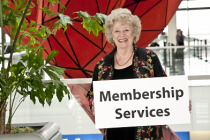Add years and years to your life
Today, there is a growing emphasis on looking good, feeling good and living longer. Increasingly, scientific evidence tells us that one of the keys to achieving these ideals is fitness and exercise. But if you spend your days at a sedentary job and pass your evenings as a “couch potato,” it may require some determination and commitment to make regular activity a part of your daily routine.
EQUAL OPPORTUNITY BENEFITS
Exercise is not just for Olympic hopefuls or super models. In fact, you’re never too unfit, too young or too old to get started. Regardless of your age, gender or role in life, you can benefit from regular physical activity. If you’re committed, exercise in combination with a sensible diet can help provide an overall sense of well-being and can even help prevent chronic illness, disability and premature death. Some of the benefits of increased activity are: Improved Health * increased efficiency of heart and lungs * reduced cholesterol levels * increased muscle strength * reduced blood pressure * reduced risk of major illnesses * weight loss Improved Sense of Well-Being * more energy * less stress * improved quality of sleep * improved ability to cope with stress * increased mental acuity Improved Appearance * weight loss * toned muscles * improved posture Enhanced Social Life * improved self-image * increased opportunities to make new friends * increased opportunities to share an activity with friends or family members Increased Stamina * increased productivity * increased physical capabilities * less frequent injuries * improved immunity to minor illnesses
MIND OVER IMMOBILITY
Getting moving is a challenge because today physical activity is less a part of our daily lives. There are fewer jobs that require physical exertion. We’ve become a mechanically mobile society, relying on machines rather than muscle to get around. In addition, we’ve become a nation of observers with more people (including children) spending their leisure time pursuing just that—leisure. Consequently, statistics show that obesity and the problems that come with it (high blood pressure, diabetes, stroke, etc.) are on the rise. But statistics also show that preventive medicine pays off, so don’t wait until your doctor gives you an ultimatum. Take the initiative to get active now.
THE FITNESS FORMULA
If you’re interested in improving your overall conditioning, health experts recommend that you should get at least 30 minutes of moderately intense physical activity on all or most days of the week. Examples of moderate activity include brisk walking, cycling, swimming or doing home repairs or yard work. If you can’t get in 30 minutes all at once, aim for shorter bouts of activity (at least 10 minutes) that add up to a half hour per day. Instead of thinking in terms of a specific exercise program, work toward permanently changing your lifestyle to incorporate more activity. Don’t forget that muscles used in any activity, any time of day, contribute to fitness. Try working in a little more movement with these extras: * Take the stairs instead of the elevator. * Park at the far end of a parking lot and walk to the office or store. * Get off public transportation a few blocks before your stop. * Take a brisk walk when you get the urge to snack. * Carry your own groceries.
ALL-SEASON EXERCISE
If you’re ready to move up to more vigorous activity, remember that “no pain, no gain” isn’t exactly true. The best-laid plans of many a fitness program have been ruined by too much enthusiasm on the first day and sore muscles on the second. A goal is an end point, not a beginning, so work toward your goal gradually. Once you’re in better shape, you can gradually increase your time or distance or change to a more energetic activity. Always check with your physician before undertaking any vigorous activity, especially if you have any risk factors such as smoking, high blood pressure, high cholesterol or obesity. The key to a lifetime of fitness is consistency. Here are some tips to help you make exercise a habit. * Choose an activity you enjoy. * Tailor your program to your own fitness level. * Set realistic goals. * Choose an exercise that fits your lifestyle. * Give your body a chance to adjust to your new routine. * Don’t get discouraged if you don’t see immediate results. * Don’t give up if you miss a day; just get back on track the next day. * Find a partner for a little motivation and socialization. * Build some rest days into your exercise schedule. * Listen to your body. If you have difficulty breathing or experience faintness or prolonged weakness during or after exercise, consult your physician.
SOME YEAR-ROUND SAFETY GUIDELINES
* Let someone know where you’re going and when you’ll be back. * Carry identification with you when exercising outside the home. * Exercise indoors or try mall-walking when it’s stormy. Don’t risk a run-in with lightning or ice. * Build in warm-up and cool-down periods to decrease risk of injury. * Avoid strenuous exercise for one to two hours after eating. * Wear sturdy, well-fitting shoes appropriate for the activity. * Wear brightly colored clothing when exercising outdoors. * Add lights and reflector tape to your body or bike if you exercise after dark. * Wear helmets and safety pads appropriate for the activity. * Move against traffic if you must run or walk on the road. * Don’t let headphones distract you from observing traffic and safety concerns. * Respect pollution alerts and exercise indoors when warnings are posted, especially if you have heart or lung disease. Avoid areas where traffic is heavy. * Take special care of your feet if you are diabetic or have vascular disease.
NO MORE EXCUSES
You can probably come up with plenty of excuses for why you’re not more active. You’re too young, you’re too old, you’re too busy, you’re too tired or you’re in pretty good shape—for your age. But with few exceptions, these excuses are pretty flimsy. There are activities for the young and old and for those with little time. So the next time you think about getting fit, don’t ask “Who has time?” Instead, ask yourself “Who doesn’t want to feel better?”






